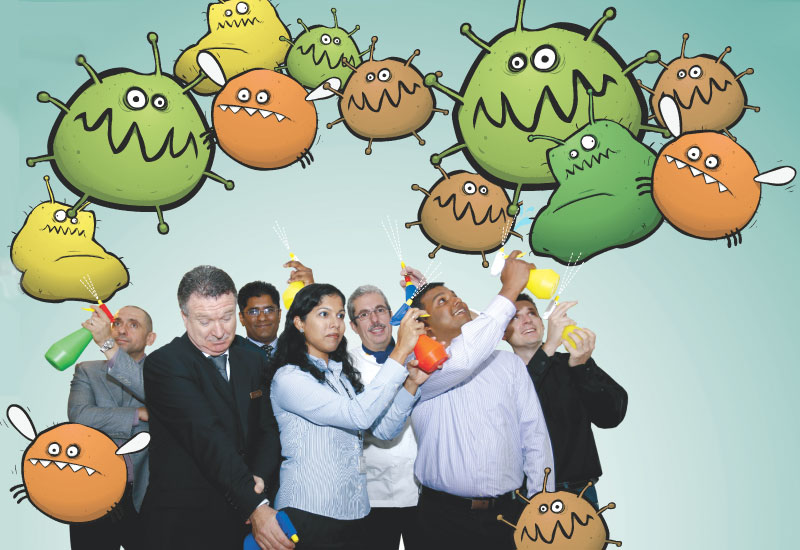Food safety plays a major part in the success of F&B business, demanding constant effort from all involved; so how is the comparitively young UAE market faring? Industry professionals met up at Deira’s JW Marriott Dubai to find out
To what degree do you think the UAE has achieved food safety today?
Uwe Micheel: We’re on the way; most four-and five-star hotels are certified now. The big change is that 10 years ago, if I had a big event involving outside catering, I’d be worried about standards.
Now, nothing will happen as long as you follow proceedures correctly.
The next step is targeting free-standing restaurants. Some are operating fantastically — generally the ones connected to larger chains which have good production facilities — but when you look at some of the outlets, I still wouldn’t eat there.
Bobby Thulasi: From a government perspective, the volume of F&B business going on here is so high, it’s difficult to control.
At an industry level, we feel companies should be responsible for what they’re doing, but we help them to achieve that standard by supporting them with programmes. If you look at the launch of the Food Safety Management System, that was one way of making each organisation responsible; we also brought in HACCP for four- and five-star hotels and manufacturers, and now we are implementing programmes like MenuSafe that can be used for the smaller outlets.
While I think it’s important to encompass the low-budget restaurants as well, you have to consider the culture of some of these places: in most cases, hygiene isn’t a priority.
So we need to let operators know that although ignoring food safety may save money now, they will end up paying later by harming someone’s health or via reputation damage. We will be launching campaigns over the next few months to help these businesses understand what it means to be food safe and what the benefits are.
At the other end of the spectrum, we’re also in the process of tying up with the other emirates to formulate policies to ensure our suppliers and incoming products are controlled at the source.
Another major objective is to be able to quantify the success of food safety here. That is not possible at this point in time, but we’re working on it.

Advertisement
Kevin Wills: One really good thing about the Municipality’s approach to food safety is that, in many places I’ve been around the world, you feel like when you have an inspection it’s you against them.
That gets people thinking ‘What do we hide? What do we not do? What do we change?’ So the fact that Dubai Municipality is actually working with us, on the same side, means it’s an educational process, not just an inspect-and-punish system. That transparency really helps everyone and accelerates the process of corrective action.
Russell Impiazzi: In general I don’t think the top end of the market has many issues; the biggest problem facing the UAE now is that of the lower-ranking outlets.
Micheel: And private homes: how many housewives will keep a rice dish for a few hours, then put it in the fridge and warm it up the next day? People think you can’t get sick from rice, but it’s actually one of the most dangerous dishes for food poisoning. Plus nowadays, people are not as resistant to germs as they used to be.
Loraine Hughes: The thing is that food safety issues and consequently standards keep on changing; the goal we’re heading towards keeps moving further away.
Micheel: Exactly; what was good enough yesterday is not good enough today.









 Search our database of more than 2,700 industry companies
Search our database of more than 2,700 industry companies









